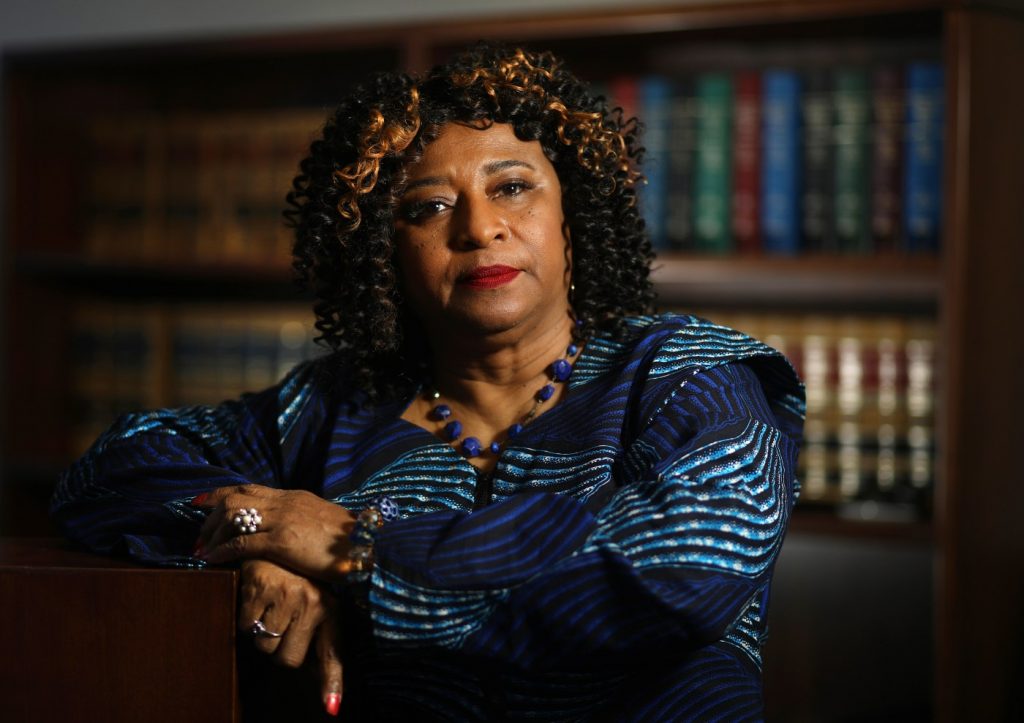OAKLAND — The recall targeting Alameda County’s top prosecutor initially appeared on the path to success early Tuesday evening, potentially striking a blow to progressivism in the criminal justice system across in one of California’s bluest enclaves.
After the first batch of voting results were made public Tuesday evening, District Attorney Pamela Price faced the prospect of becoming the first elected district attorney to be recalled from office in the county’s history. An early majority of voters voiced support for removing her from office less than two years into her first, six-year term, though final results could take days to be finalized as city and county election officials continue to count ballots cast on Election Day.
If the results hold, Price’s self-proclaimed “exclamation point in history” as the first Black woman elected to the office would end in a historic whimper. The five-member Alameda County Board of Supervisors would then be tasked with appointing a replacement to serve until the next general election in 2026.
The early returns came as voters appeared in a mood for wholesale changes at the highest levels of the East Bay’s political scene. The recall targeting Oakland’s Mayor Sheng Thao also was passing by a nearly 2-to-1 margin, according to initial results posted after the polls closed.
Moments after the first batch of counted ballots were posted online, the leaders of the DA recall voiced early optimism. If the results held, it would suggest “the voters and the people in the county would like to see change and would like to see someone who is really taking the job seriously and taking the victims and the families seriously,” said Oakland Chinatown leader Carl Chan.
For Price, the election marked a referendum on progressive politics in the criminal justice system — particularly after the 2022 recall of San Francisco District Attorney Chesa Boudin, a fellow progressive district attorney who also served as Price’s confidant and advisor.
The longtime civil rights attorney rose to power that same year with the goal of reimagining how the DA’s office prosecutes cases and pushing back against the nation’s legacy of mass incarceration, which disproportionately affected Black residents and communities of color.
Yet her critics blasted that approach as being too lenient on crime – particularly as she personally intervened in high-profile murder cases during the early months of her administration. Each time, she sought significantly less prison time for defendants who had faced a lifetime behind bars after being charged by former DA Nancy O’Malley.
Recalling Price would “certainly slow the progress of reform” in the Bay Area and elsewhere in California, said Jon Simon, a criminology professor at the University of California, Berkeley. That’s despite many of Price’s policies falling largely in line with goals set by the state’s Committee on the Revision of the Penal Code, which urged prosecutors to curtail prison terms and their use of many such enhancements that can add years to a sentence.
“The political message is: Don’t expose yourself by adopting very transparently progressive policies,” Simon said. “You can pursue them, but do it on a one-by-one basis that really keeps it as quiet as possible.”
Concerns about public safety and crime also proved a consistent theme in the bid to recall Oakland Mayor Sheng Thao, with her critics repeatedly seizing on a public perception of rampant crime across the East Bay’s largest city. That was true despite the city enjoying a significant drop in killings and many other violent crimes this year – a reduction typified by Oakland recently logging its first homicide-free month this year.
Throughout the past year, the two recall campaigns shared a single deep-pocketed supporter who ultimately became the financial powerhouse driving each issue.
Philip Dreyfuss, a partner of the San Francisco company Farallon Capital Management, pumped at least $1.9 million into elections across Alameda County over the last year, the vast majority of it to remove Price and Thao from office, campaign finance filings showed.
Price’s supporters have seized on the concentrated source of that money, while suggesting that any successful recall would simply “confirm the power of big donors in local politics,” said Christine Soto DeBerry, founder and executive director of the Prosecutors Alliance. They also have decried the knee-jerk nature of the recall campaign, highlighting how the first public rally against her came three month into her tenure in April 2023, with the formal recall committee forming three months later.
The effort was led by anti-violence advocate Brenda Grisham, Chan and included a mix of real estate investors, technology executives and past and present prosecutors unhappy with Price’s leadership.
“It’s a politically-motivated recall,” said Victor Ochoa, 72, who was president of the Alameda County Bar Association in 2005. “It has nothing to do with her job performance – she wasn’t even given a chance to do her job.”
Recalling Price “means you can run hard and win, and if the billionaire class is offended or doesn’t like your politics, they can fund a recall immediately,” he added.
Price’s term was already unique, in that she was elected to serve six years, instead of the typical four. That’s because voters recently changed election laws to place elections to the office of district attorney to match those of presidential contests, in a bid to increase voter turnout and engagement in those races.
Still, Price faced an uphill battle to remain in office.
Government officials up for recall are removed from office 67% of the time when that question is placed on a general election ballot, according to a review of nearly 1,200 recall elections from 2011 to 2023 conducted by Joshua Spivak, a senior research fellow at Berkeley Law’s California Constitution Center.
That compares with recalls being successful about 57% of the time that voters are asked to submit ballots during a special, off-calendar election, he said.
Jakob Rodgers is a senior breaking news reporter. Call, text or send him an encrypted message via Signal at 510-390-2351, or email him at [email protected].


